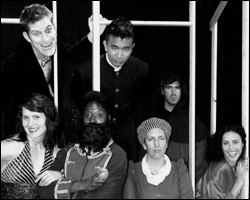It’s possible, without too much strain, to draw comparisons between the two plays currently being presented by Annex Theatre at Empty Space: An American Book of the Dead: The Game Show (ends Sat., July 24) and Principia Discordia (ends Fri., July 23). Both use absurdity, a rapid-fire pace, and elements of burlesque in an attempt to grapple with the malaise and swoon of modern American life. That’s no easy task, in art or anything. Everywhere nihilism nips at our heels, and the kaleidoscopic wreckage of history piles up at such a blinkered clip it’s a wonder anyone can focus on anything at all anymore, much less hone down for a few hours of allegorical pondering. What’s more, the stage is an especially beleaguered space, being more than ever in dire competition with the spastic white noise of the ubiquitous media monster, blah blah, yak yak. (Look at the amnesiac tap dance they did around Ronnie’s corpse, dig the Fox spin on Iraq.) It’s war all the time, global, sprawling, sound-bit, and rapid-cut, and there will be no more streetcars named Desire, no more dead salesmen—or so it would seem. What’s drama to do?
American Book of the Dead, by Seattle-based playwright Paul Mullin, opts for spectacle, and as such it has much to recommend it. The sheer vitality of the production, directed by Mike Shapiro, is infectious, and the macabre, carnivalesque atmosphere on stage works to imbue the action with just the right combination of baroque absurdity and frenetic vigor. The conceit—three game-show contestants are vying for perfect enlightenment on the “playing field” of history—provides abundant opportunity to riff on the savagery and madness roiling at the heart of American society, and many of the skits are quite wonderful, especially the one in which a New York subway train becomes the surreal scene of a meditation on re- incarnation, race, and identity. This is but one example of Mullin’s playfulness with the Tibetan idea of bardo, the stopping-off point between life and death that souls must navigate in order to achieve, well, whatever it is Tibetan souls achieve; bliss, I guess. Smart to use this stuff as a wedge into the essential emptiness echoing at the heart of consumer culture, and to turn it into a game show. Maybe too smart.
Because, unfortunately, it is also as a spectacle that the play jumps the tracks, causing its wildly disparate elements to pile up in a confusion of allusion and intent. Mullin’s script appears to want nothing less than to sound out the spiritual lack symptomatic of so much American life, but he brings too much to bear on his project. Too often the material falls prey to an overweening cleverness, a kind of hysterical overreaching that stumbles into the worst tendencies of postmodernism: a profusion of references subsuming narrative, and clutter covering character. As each contestant swims through his or her particular bardo—transformed, for instance, into an episode of history such as the Battle of Gettysburg—characters get lost in the crazy shuffle, and the audience is left with little to hold on to. The cast does its best with the material, and there are moments when individual actors are allowed to shine; for the most part, however, the performers appear by turns bewildered or bemused by the congested energy of the script.
After a while, the proliferation of allusions and subplots and neo-mythologies can scarcely conceal the fact that there are no characters strong enough, developed enough to carry the narrative’s burden—and therefore, really, there’s no narrative. The effect is vaguely vaudevillian, but the whole is less than the sum of its parts, though many of the parts are excellently rendered and pretty damn funny. Like a cocktail party full of wits and wags, the play is a hodgepodge of intriguing ideas and sharp puns, but without a discernible center of gravity. And so the chaos becomes, in the end, exhausting.
Equally chaotic but somehow more successful (if way less ambitious) is Annex’s late-night production of Principia Discordia, 50 minutes or so of Monty Pythonesque nonsense that levitates on the charm of its own silliness. The show is a quick jolt of guerrilla theater made by and for geeks. It’s played as a series of brief skits, each punctuated by a Harpo-like toot on a horn (brawp! brawp!) and all revolving around an imaginary cult worshipping Eris, the Goddess of Confusion (played by Betsy Morris). The idea of the cult, it seems, is to combat the dangerous chaos of the world with yet more chaos, to “wipe thine ass with what is written and grin like a ninny at what is spoken.” The show gathers a kind of weird, zany momentum, helped along quite a lot by the performers’ own infectious enthusiasm for the absolute nonsense they’re spouting. The five actors are all excellent physical comedians, and the slapstick bits are superbly choreographed. The end result might not add up to much—and, really, it only pretends to want to anyhow—but it’s a lot of fun to watch nonetheless.








